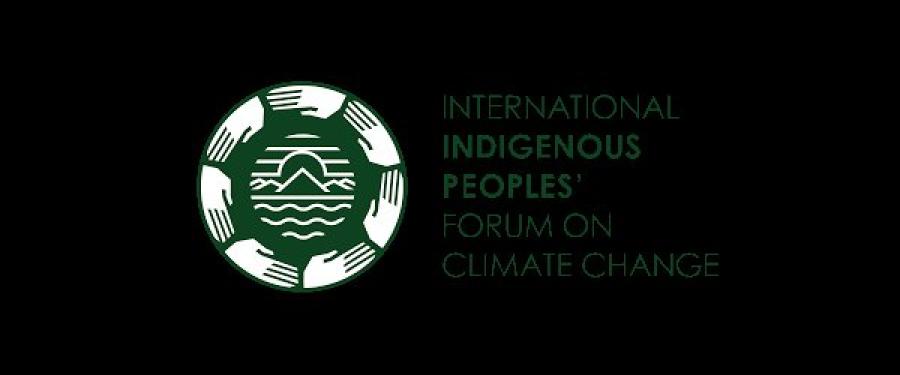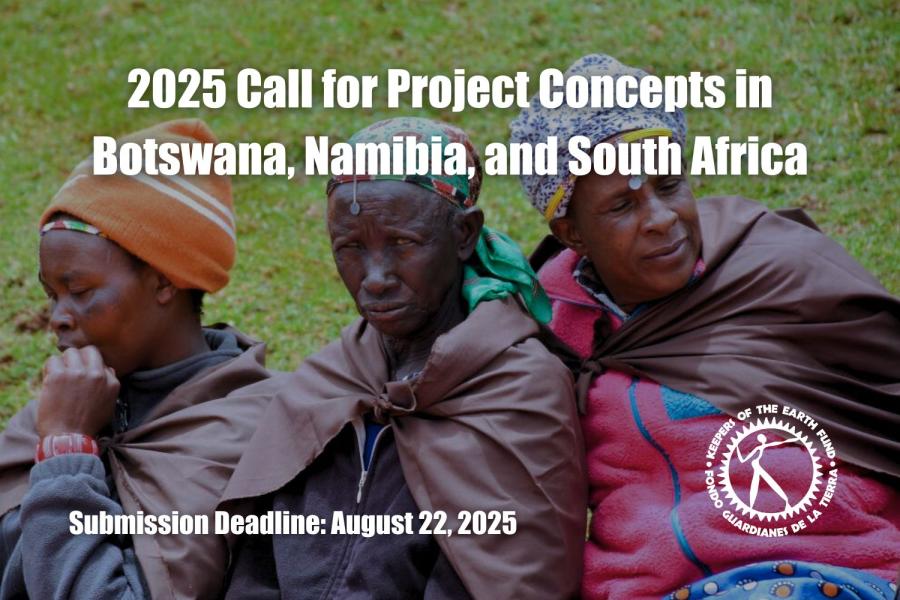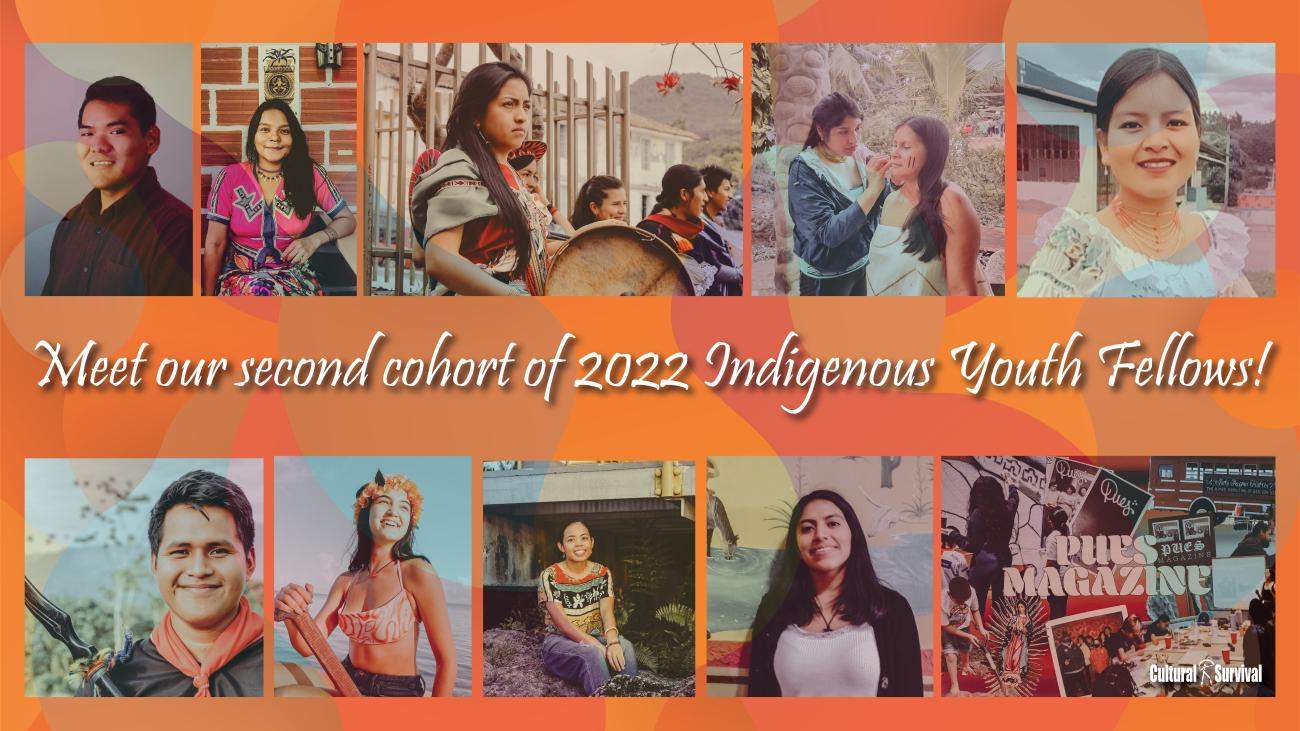
Cultural Survival is pleased to announce our second cohort of 2022 Indigenous Youth Fellows as part of our Capacity Building Program. Our Indigenous Youth Fellowship project supports young Indigenous leaders between the ages of 18-28: knowledge holders and creators who, through their leadership and creativity, have the potential to significantly advance their work, leading transformative and impactful spaces within their communities. Since 2018 we have awarded 62 fellowships that supported 82 fellows.
With years of experience coordinating capacity building through workshops, conferences, exchanges, and networks, Cultural Survival believes that it is essential to listen and respond to the self-determined needs of communities to provide the support that is sustainable and, most importantly, relevant to the needs of the communities we serve. The participation of our Indigenous youth is crucial in strengthening self-governance, protecting land rights, fighting climate change, containing the loss of biodiversity, restoring ecosystems, and stewarding Indigenous cultural heritage. Indigenous youth are changemakers, and youth leadership development is an integral part of ensuring the well being of our Indigenous communities.
Meet our second cohort of 2022 Fellows:
Shaylin Nicole Salas (CHamoru), Guam
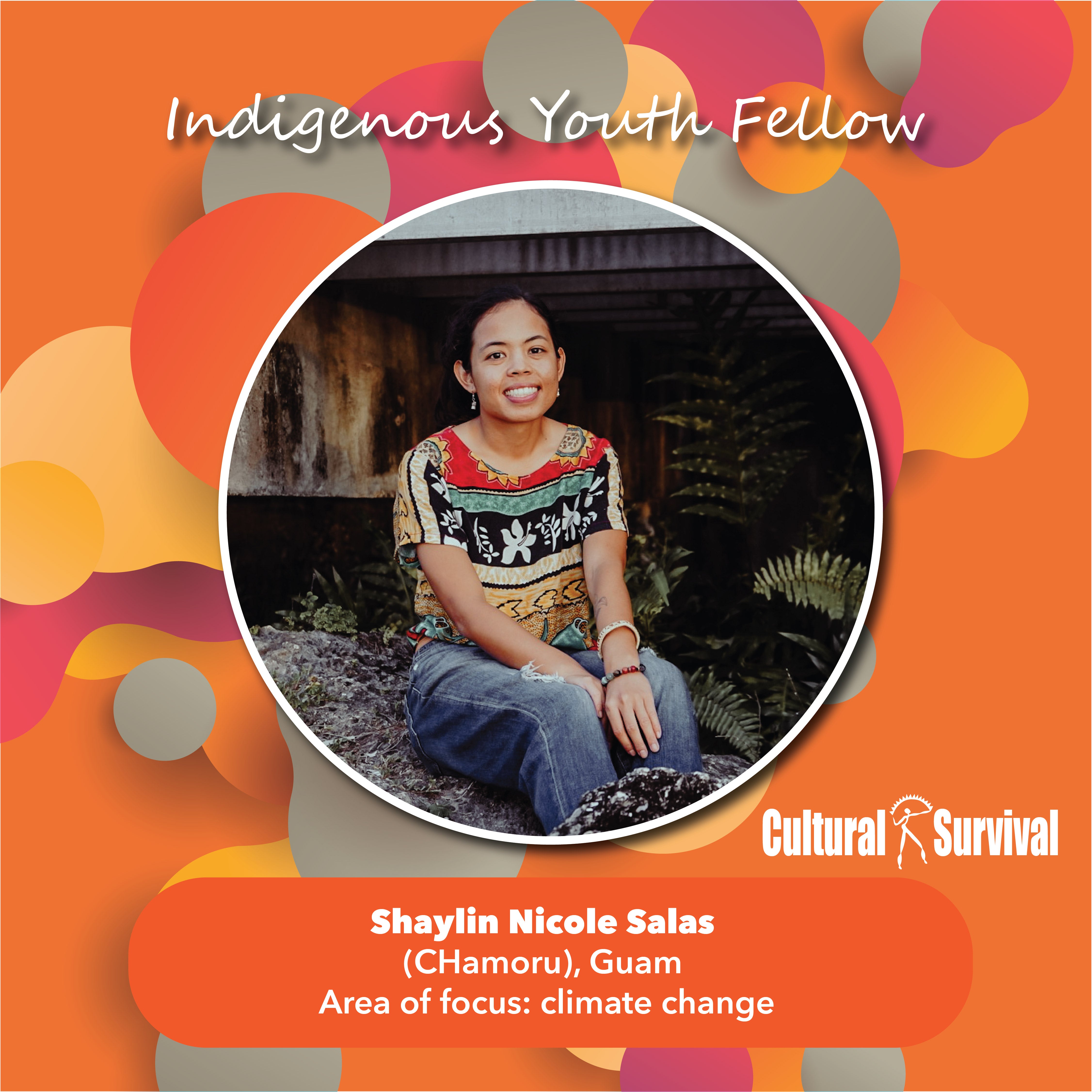
Shaylin is a writer and environmental justice advocate. She was born in Guåhan and raised in Washington State. In 2019 she earned her MS in Environmental Advocacy, and since then has moved back home to fight for a more just world alongside her people and to live lovingly on the land of her ancestors. She has been studying and engaging in environmental and climate work for nearly eight years. On Guåhan, she is most involved in efforts of food sovereignty, climate justice, and decolonization. Shaylin also enjoys playing in the ocean, being with family, and living and learning about CHamoru culture.
Her fellowship project, “Guåhan Climate Solutions Project,” will produce a guidebook and posters that combine local research and Indigenous voices about climate change and address it through Indigenous-led adaptations and solutions.
María Rosa Guandinango Guandinango (Kichwa), Ecuador

Maria is from Cotacachi, northern Ecuador. Throughout her life, she has spread her culture through traditional dance. She leads the dance groups Kury Tushuy (Golden Dance) and Sumak Sisay Tushuy (Wonderful Blooming), in which Indigenous women from the San Pedro community participate. María’s fellowship project objective is to promote her culture. Thanks to the unconditional support of the leaders of her community, she has managed to share and strengthen her ancestral knowledge. She has shared Andean science, dance music, ancestral medicine, and fabrics with girls from her community, all through the Kichwa language.
As part of her fellowship, she will develop the project "Dance of Spirituality-Connection with Pachamama." Her project seeks to validate and revitalize ancestral knowledge through dance, disseminating it in a choreographic and audiovisual way.
Nixon Danny Andy Narvaez (A'i Kofan), Ecuador
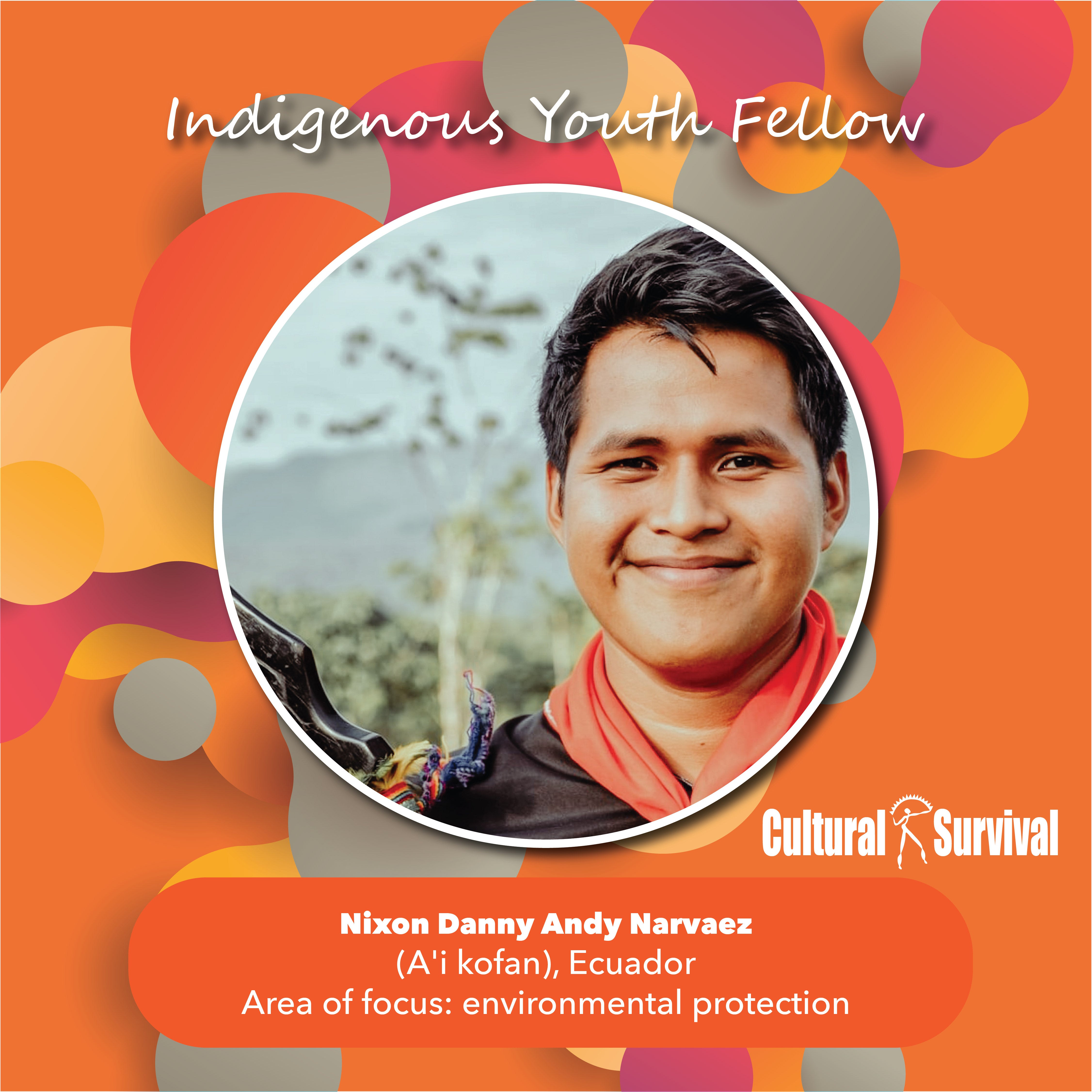
Nixon is from the Sinangoe community, located in the Ecuadorian Amazon. His town's relationship with nature is fundamental since the majestic Aguarico River originates in his territory. He and his community know that nature provides them with water to drink, bathe, grow medicinal and food plants, and raise animals. The fight to protect nature is the leading cause in their community, which they have defended against environmental pollution and mining exploitation. Nixon has dedicated himself to documenting through media the relationship between nature and his community and the processes of defending the environment. His work is fundamental for future triumphs in favor of his ancestral territories.
Nixon will carry out the project “Community Communication from the Territory,” where he will train Indigenous youth in the Ecuadorian Amazon. It will consist of photography, video, and social media workshops focused on raising awareness about how their lands are impacted by extractive activities and pollution.
PUES Collective (Yaqui), United States
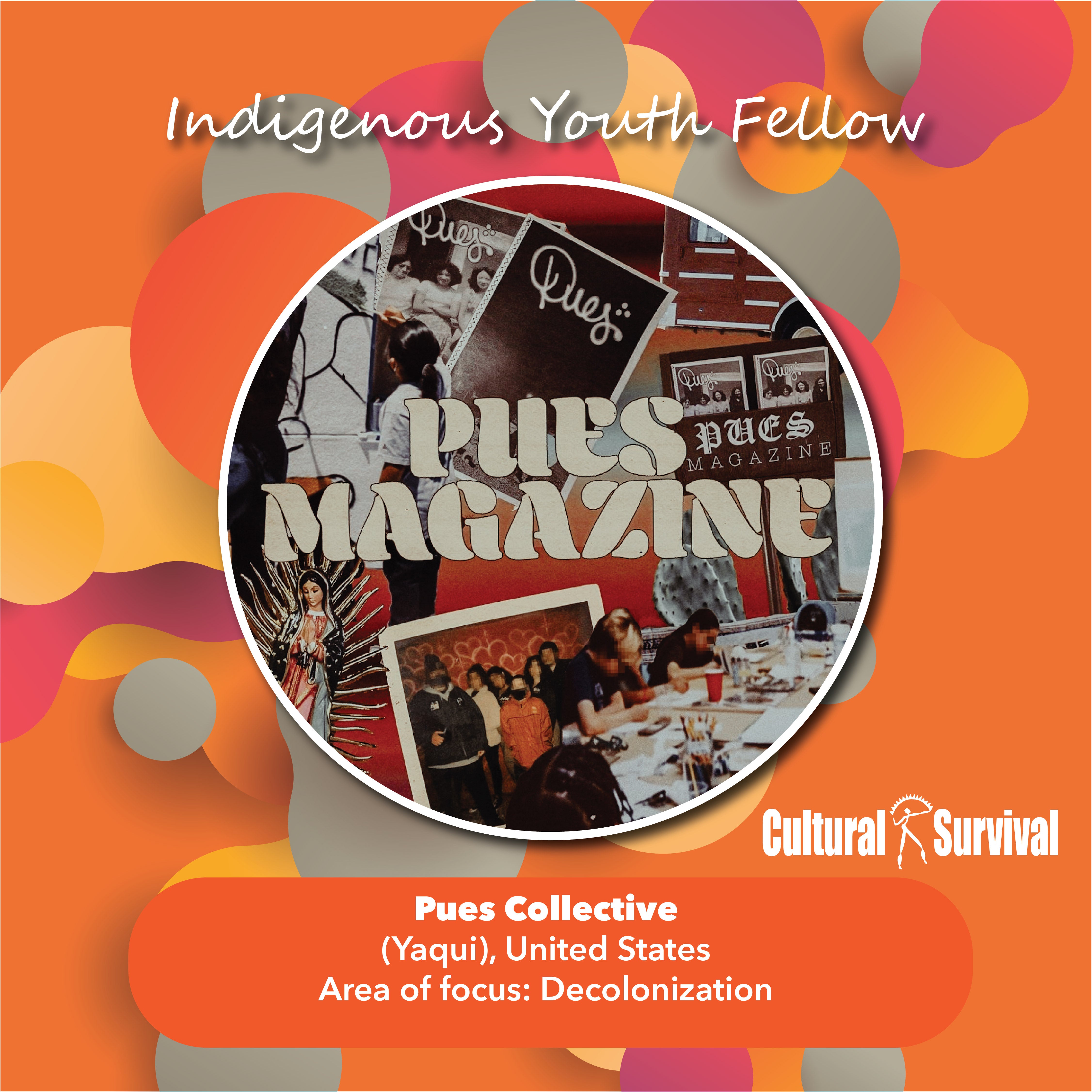
PUES (Yaqui) is a collective of Indigenous/Brown folx enforcing action-based decolonization through ceremonial practices and organizing while defending community equity and action. As a group of writers, graffiti artists, seamstresses, musicians, trade smiths, environmentalists, and graphic designers based on the southside of Tucson, Arizona, they focus their intentions on traditional ways of communicating by protecting their culture from mainstream media. Their current efforts include a local publication created, printed, and assembled on the Pascua Yaqui Tribe revitalizing their culture, history, and revolution while maintaining anonymity in alliance with their beliefs of empowering their people to take equal ownership and finding representation.
PUES Collective’s fellowship, titled “PUES Youth Outreach Project,” will hold an afterschool space weekly for youth to exchange lived experiences while applying creative solutions to their economic and social issues. This safe space targets BIPOC/2SLGBTQIA+ youth and will promote empowerment and unity amongst young revolutionaries through freedom of self-expression.
Virginia Maribel Sam Chub (Maya Q'eqchi'), Guatemala
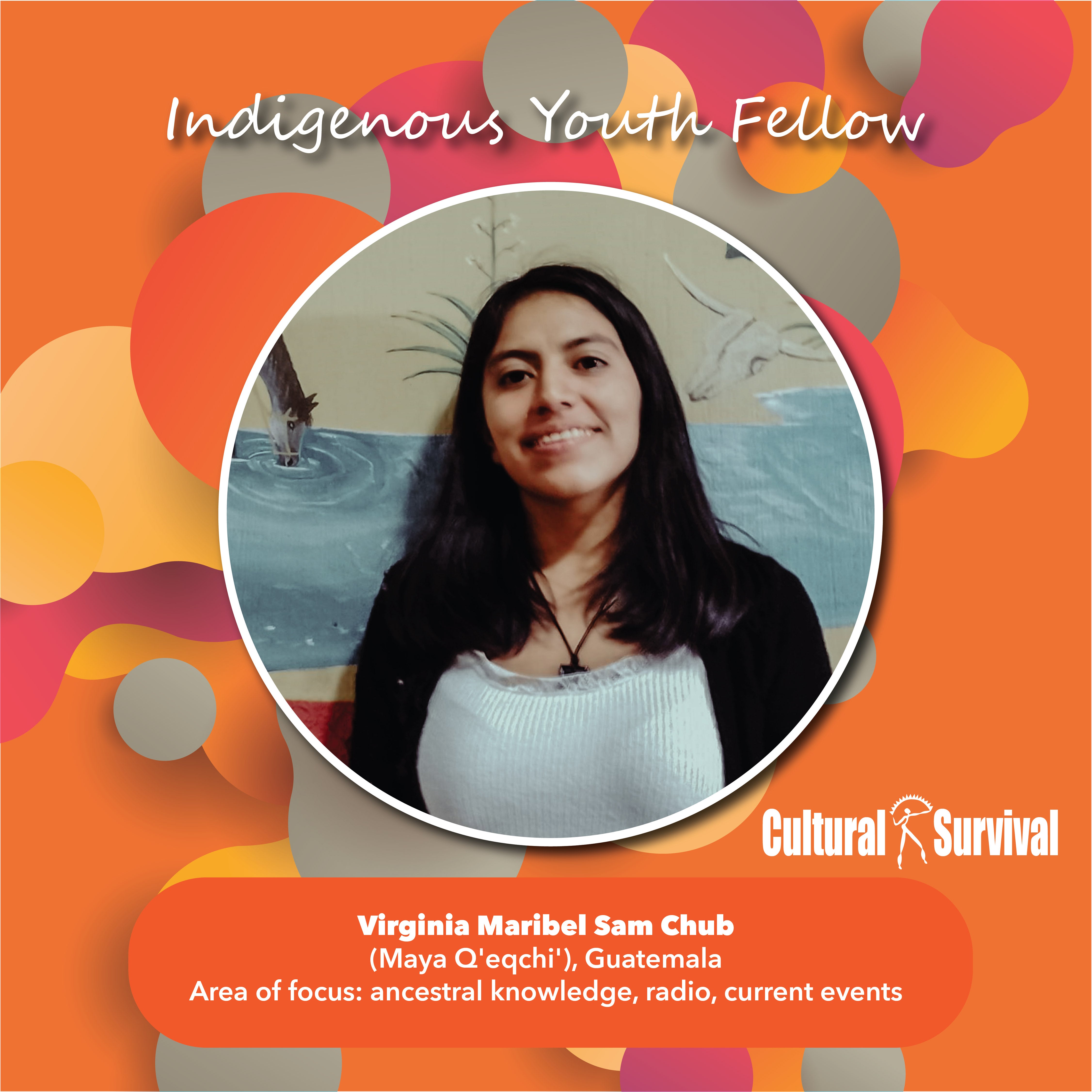
Virginia lives in Tipulcan village, San Pedro Carcha, Alta Verapaz, Guatemala. She is an advocate of her territory and supports communities in various areas. Along the way, she has discovered the most important community needs and problems and has been trained as a legal counselor in cases of violence against women. Virginia studied Intercultural Bilingual Early Childhood Education and is currently strengthening her technical skills as a community communicator. She performs artistic communication through theater, photography, and audio media. The main issues she addresses are migration, women's rights, and child labor.
As part of her fellowship, Virginia will develop the project titled “Awas.” Her project seeks to investigate, document, and broadcast the worldview of her people on the radio. Likewise, the project will highlight community problems and reflections on health, education, agriculture, and other current issues. Awas means ancestral knowledge and practice on human and animal life and agriculture, also known as the Occult or Secret.
Dyllon Mills (Ute Mountain Ute), United States
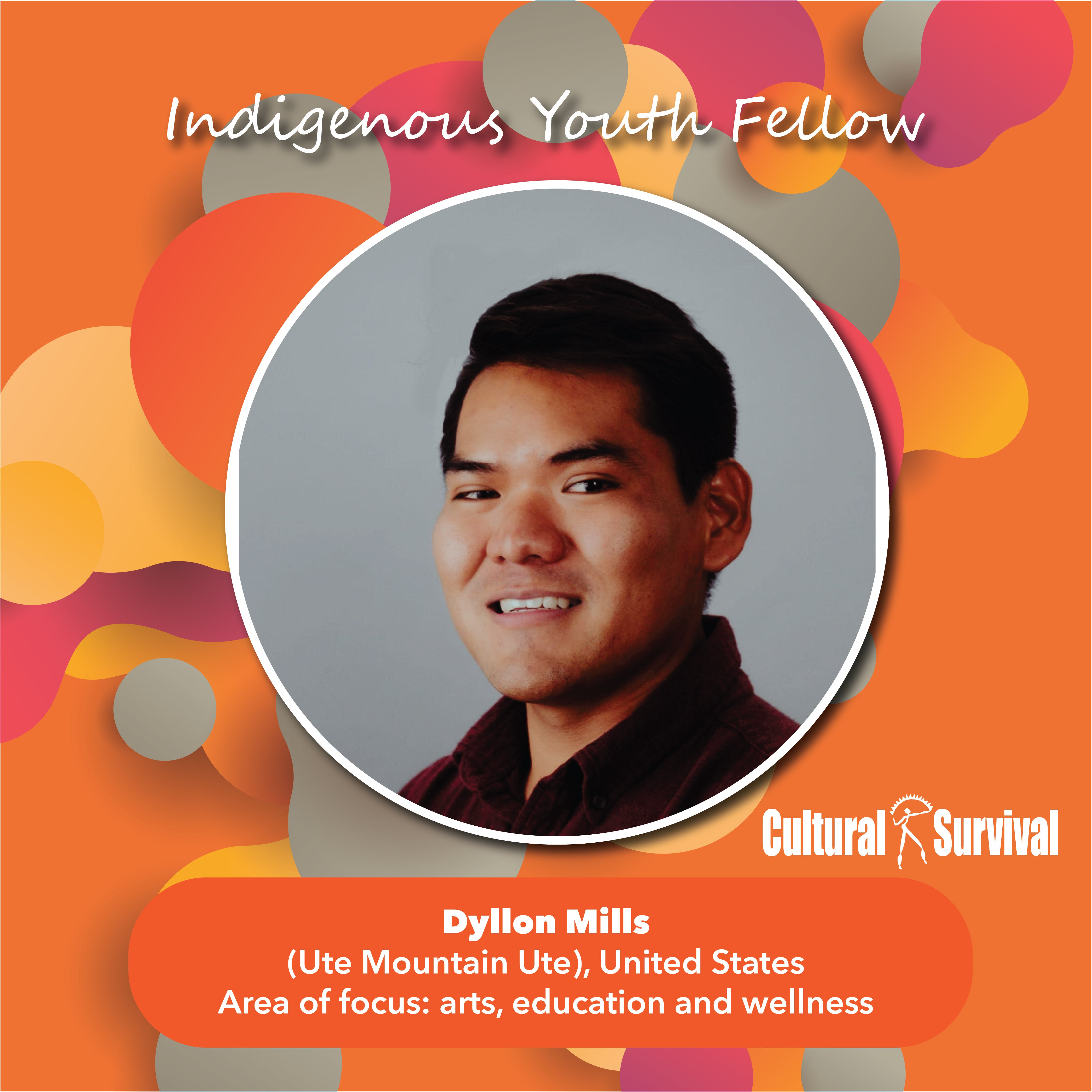
Dyllon is from the lands of the Ute Mountain Utes of Colorado. He recently graduated from Fort Lewis College with a Bachelor of Arts in Public Health, and serves the southwestern region of Colorado in multiple fields. He has dedicated his entry into the workforce to giving back to his community, working as a Community Health Programs Associate of Southwestern Colorado Area Health Education Center where he helps develop and implement grants and contracts related to entry-level health careers, educational support, and community health education in eight counties of southwest Colorado. In addition, he serves the community of Towaoc as the Vice-Chair of the Board for Kwiyagat Community Academy, the first Tribal-owned charter academy in the state of Colorado.
His fellowship project, “Indigenize and Communicate KCA Project,” will heighten the physical environment of a positive school climate for students at the Ute Mountain Ute Reservation by crafting and installing graphic murals representing the Ute Mountain culture and language across the academy.
Mayra Alexandra Cortez Calancha (Quechua), Perú
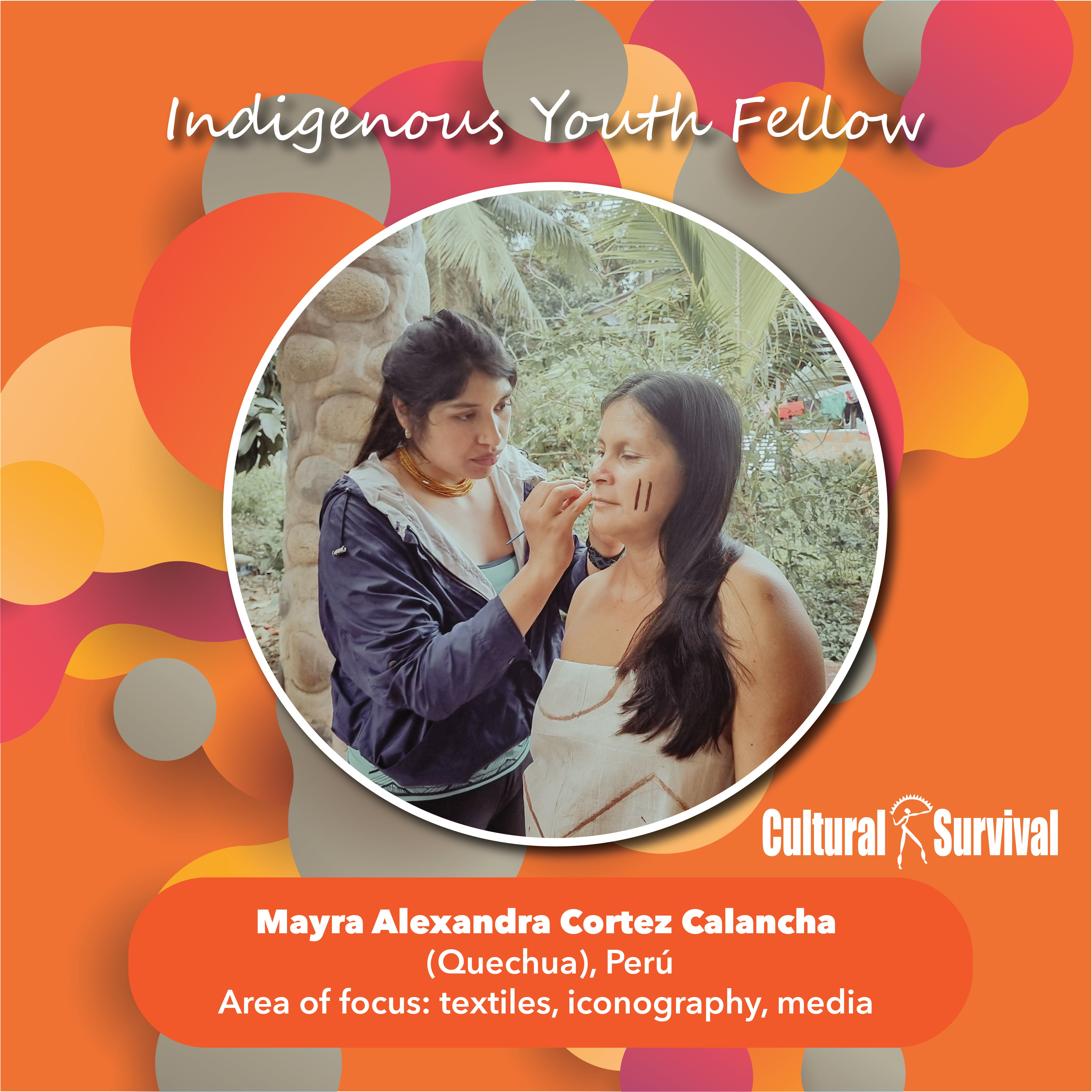
Mayra is a visual artist, designer, and illustrator from Cusco, Peru. Since she was a child, she was immersed in the world of art, cinema, music, and culture, which allowed her to discover her roots. She has now focused her work on nature, symbolism, and the wisdom of the Andean-Amazonian Peoples. Through creativity and research, she uses art and painting as a channel to transmit deeper messages.
As part of her fellowship, she will carry out the project, ”TEJEMOS PARA NO OLVIDAR, Manos, Mujer y Memoria” (We Weave to Not Forget, Hands, Women, and Memory). She will hold a workshop on Harakbut textiles, symbology, and iconography in the Shintuya-Madre de Dios Native community. She will also produce a woven jewelry collection and will eventually share her creations through a digital photo gallery and social media.
Nataly Domico Murillo (Embera), Colombia
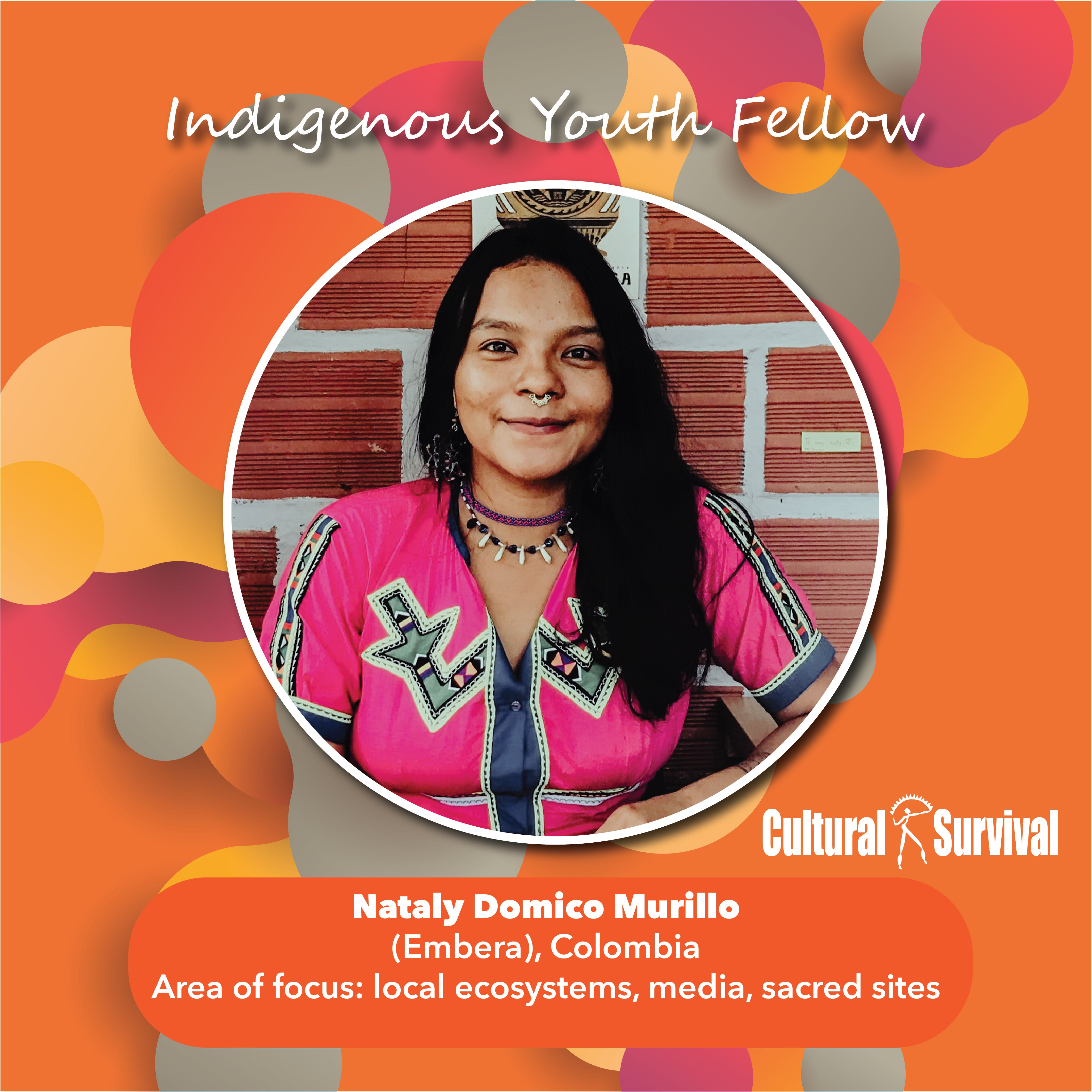
Nataly is from Urabá Antioquia, located in northwestern Colombia. She is a researcher by profession. Thanks to her political and community experience, she has done research on communication processes, women's leadership, cultural revitalization, and environmental conservation efforts. She has focused on protecting sacred sites, work that has led her to recognize the importance of traditional medicine and the ancestral knowledge of Native peoples for the care and balance of nature. She is currently an advisor to the social area at the Cabildo Mayor Indígena de Chigorodó in Antioquia. She is the National Coordinator of the Territories of Life Colombia Network and Professor of the degree program in Pedagogy of Mother Earth at the University de Antioquía.
Nataly will implement the fellowship project, “Communicate to Defend the Ecosystems and Bioculturality of the Sacred Sites of the Embera Eyabida Peoples of Chigorodó.” This project seeks to make visible and position their agendas to resolve community problems through audiovisual tools that serve to show the ecosystem and biocultural values of the Embera Peoples of Chigorodó.
Jayna Shoda Meyer (CHamoru), Guam
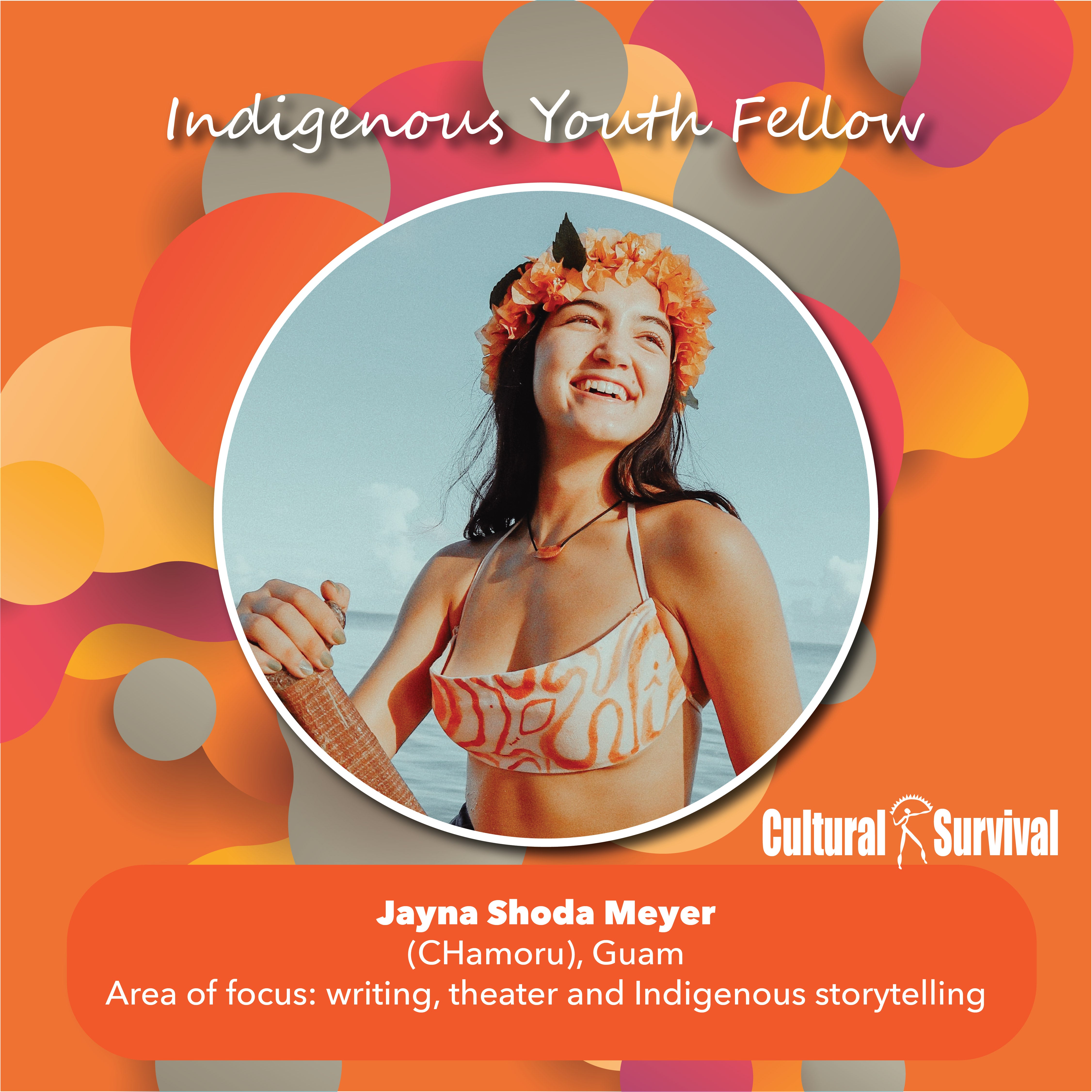
Jayna is an actor, director, and writer currently studying Theatre Arts at Boston University. Born and raised in southern California, she is a diasporic CHamoru with ancestral ties to the islands of Saipan and Guåhan in the Marianas. Jayna is passionate about sharing CHamoru history and stories through her work and aspires to see a world with an abundance of Pasifika representation in theater. She strives to create decolonized spaces that decenter capitalism and white supremacy. Recently, Jayna directed Episode 3 of Breaking Wave Theatre Company’s Legends of Guåhan Podcast Play Series (available on all streaming platforms). Jayna is currently working as the Co-Director of the Oral Storytelling Project with Breaking Wave, a devised CHamoru theater project that combines traditions of oral storytelling with contemporary theater.
Jayna’s fellowship, “Oral Storytelling Project Phase,” will provide Indigenous CHamoru writers with skills and guidance to create their own stories and explore stories of their lineage through theater. During her project, a group of Indigenous writers will gather stories from their community and weave those stories into a theatrical production to be shared with the Guam community.
Adriana Vanessa Tisoy Tandioy (Inga), Colombia
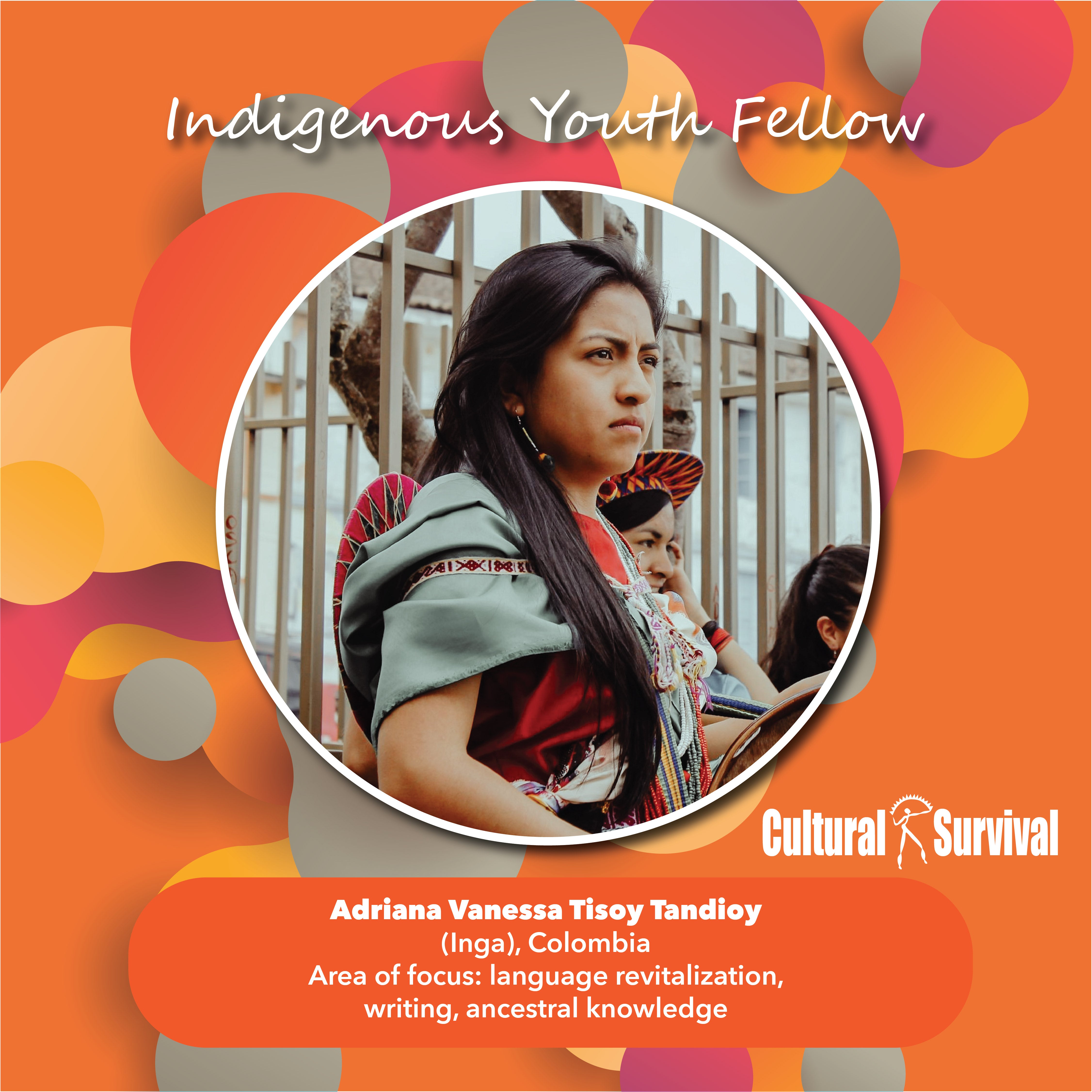
Thanks to her parents Benjamín and Esperanza, Adriana forged her path in Buen Vivir (good living), care, and respect towards the Alpa Mama/Mother Earth and Inga spiritual knowledge and traditions. She holds a Spanish Language and Literature degree from the University of Nariño. Adriana is a representative of the Kusikui Indigenous youth group, a mediator for the Taita Gabriel Tisoy Mansajoy itinerant rural library, and coordinates the Inga language research committee on the Inga Rimai radio program.
Vanessa will implement the fellowship project, “Uchulla parlu uchullakunamanda” (Short Stories in Inga for Girls and Boys). Through audio and written documentation, she will strengthen the practice of the Inga mother tongue, which will allow the word of the wise men and women of the community to be spread. This project will contribute to the conservation and documentation of knowledge for strengthening the identity and practice of the Inga mother tongue.

